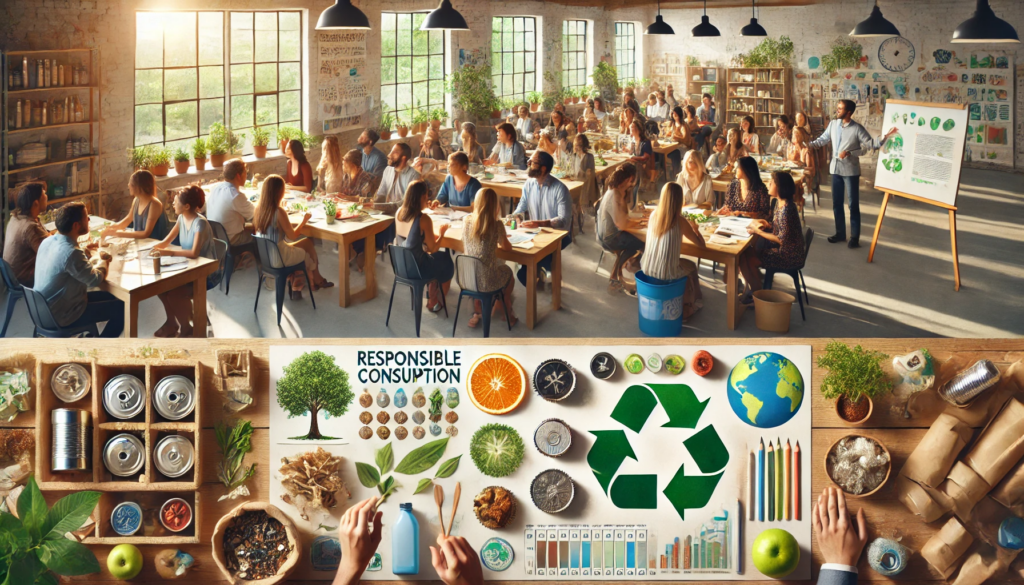I grew up in a family that taught me to value what is truly important. My parents showed me that true wealth isn’t in material possessions. It’s in taking care of the environment and respecting others.
Today, as a mother, it’s my task to teach my children to be responsible consumers. I want them to be agents of change. They will learn to make choices that benefit the planet and the community.
In a society that worships excessive consumption, it’s crucial to educate our children about responsible consumption. They will grow up to be adults who can make good decisions for themselves and the planet.
Key Learnings
- Understand the concept of responsible consumption and its importance for sustainability.
- Recognize that we are an integral part of nature and our consumption habits directly impact the environment.
- Develop the ability to make conscious decisions, prioritizing quality of life and collective well-being.
- Learn to reduce waste, reuse, and recycle, contributing to the circular economy.
- Understand the importance of fair trade and local consumption to support sustainable communities.
What is Responsible Consumption?
Responsible consumption or sustainable consumption is a movement that encourages people to think about the impact of their consumption habits. This includes environmental and social well-being. The goal is to make better choices about what to buy, opting for products and services that care for the planet and help society.
Concept and Principles of Sustainable Consumption
According to the Akatu Institute, responsible consumption means carefully thinking before buying. This includes asking why, what, how, and from whom to buy. It is also important to consider the use and disposal of the product or service purchased. Choosing options that reduce environmental impact and promote social equity and responsibility is essential.
A survey by the National Confederation of Industry shows that 74% of Brazilians already practice sustainable habits. This includes separating waste for recycling and preferring companies that care about the environment. Additionally, 90% believe that conscious consumption can make a significant difference.
“We consume 50% more renewable natural resources than the Earth can replenish or regenerate.”
It is clear that consumption has a significant impact. In 20 years, another 3 billion people will enter the consumer market. To meet this demand with current standards, we would need 4.5 planets.
That’s why responsible consumption is essential. It helps protect the environment and promotes social equity. This way, we can build a more sustainable future for everyone.
Why Teach Responsible Consumption in Childhood?
Teaching Early Childhood Education and Conscious Consumption from an early age is very important. It helps children grow into conscious adults. They will learn to make good choices for the environment and society.
This Habit Formation also teaches cause and effect. Children feel valued and heard. They learn to express their opinions and feelings, developing their Child Protagonism.
Moreover, this education helps teach financial literacy. Children learn to manage their money responsibly. This prepares them for the future.
Children who understand conscious consumption are happier and more successful. They avoid financial problems and the anxiety caused by consumerism.

“According to the Akatu Institute, conscious consumption is defined as a social movement that aims to make people reflect on their consumption habits.”
It is crucial that children have examples of sustainability at home and in school. This way, they learn to value what truly matters. They learn to plan purchases and reduce their Environmental Impact.
Taking children close to nature can motivate them to be more sustainable. They may prefer biking and correctly separating waste. Books like “Planet Earth – Our Home” and “Water – Source of Life” are great for teaching about Conscious Consumption and sustainability.
Education for Responsible Consumption: Benefits for Children
Encouraging children to reflect on consumption helps them understand cause and effect. They feel important, heard, and free to express their ideas. This supports child protagonism from an early age.
Developing Protagonism and Global Awareness
Understanding the importance of planned consumption helps children develop global awareness. They become more engaged and responsible citizens. This motivates them to make a difference in the world.
Stimulating Financial Education
Using a piggy bank to teach about money makes financial education fun. It helps children learn important skills for the future.
Promoting Future Happiness and Well-being
Discussing conscious consumption with children prepares them for smart choices. This brings happiness and well-being as they grow. This early education shapes a more balanced generation.
With education for responsible consumption, children learn essential skills. They are prepared to face consumption challenges wisely. This benefits not only them but also society.
How to Involve Children in Responsible Consumption Practices?
To teach responsible consumption, involve children in daily activities. Here are some tips:
- Family Planning: Include children when planning household purchases. Teach them to choose sustainable and ethical products.
- Creating Sustainable Habits: Encourage habits like recycling and saving energy. Turn these activities into fun family projects.
- Environmental Education: Use educational materials, such as books and documentaries, to teach children about environmental issues. This will help them understand their role in protecting the planet.
- Sense of Responsibility: Help children feel responsible for their actions. Teach them to value resources and make conscious decisions.
- Reflection on Consumption: Talk with children about their consumption choices. Discuss how these choices affect the environment and society.
Conclusion
Teaching responsible consumption is an essential part of parenting. It prepares children to become conscious adults. By incorporating these practices into daily life, we are building a more sustainable future for everyone.
